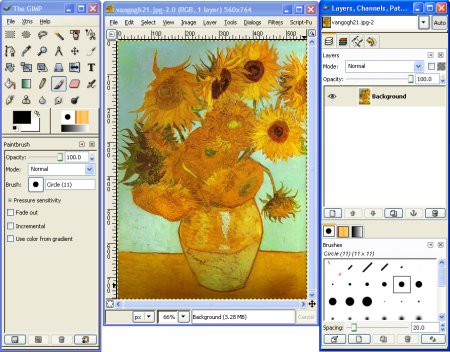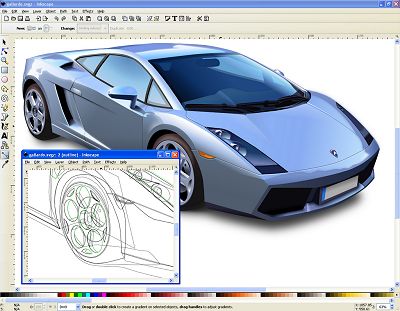Being a graphic designer can be a pretty pricey thing. We like to have powerful computers and expensive enterprise software. I'm looking at you Adobe Create Suite .... There are alternatives that aim to meet the needs of our profession and products. Graphic design is an art and software is just a tool like a paint brush. Open Source software development has come up with such cool free products as GIMP, Inkscape and KompoZer.
I know they all sound kind of geeky and in that way there's something inaccessible sounding about it, but hopefully what you see here will help you get past your fears, uncertainty and doubt. It's all free to use so there isn't much risk involved. Open Source isn't the solution for everything, but it's as a public service that we can often tap into. We're an adventurous bunch, so let's try something different.
Here are some free graphic design programs that might just bring graphic design to the artists who can't or don't want to spend the money on the insanely priced corporate versions.

GIMP is the most widely known Photoshop alternative. Most of the functions that you might use in Photoshop are implemented; you can crop, adjust colors, save as different file formats, use various filters and brushes. CMYK support is there but fairly weak and difficult to handle which may be completely unacceptable for most of us in the print industry. However for web design this won't be a problem since it natively supports the RGB color space. Photoshop users may want to look into GIMPshop, a modification package which is intended to help GIMP mimic the Photoshop user interface. GIMP is available on Windows, Mac and Linux.
This handy program adds itself to your Windows printer menu. Anything you print can be converted to PDF format or various other graphics formats for you to manipulate. Very handy to have on any system.

Inkscape is a vector editor similar to Corel Draw or Adobe Illustrator. It uses the standard SVG format which makes it compatible with other graphics programs. The interface is streamlined and familiar since they focus on usability. It includes tutorials and tooltips too to ease your transition. They've reduced the number of palettes and all palette options are available as keyboard shortcuts. The interactive tutorials and simple interface make it very easy to start using, especially if you are familiar with other drawing programs. It's definitely a good one to look into. Inkscape is available on Windows, Mac and Linux.
I'm a heavy InDesign user and since it's what I use at work, that's not likely to change. It is good to know that there is an open source alternative for InDesign, Pagemaker, QuarkXPress or even the unfortunate Microsoft Publisher. It's designed to be print ready and runs on Linux/Unix, MacOS X, OS/2 and Windows. If your printer accepts PDFs or any of the other formats supported by the program, you're pretty much set. It's designed to work with professional equipment in a prepress environment. If you're interested in designing books, brochures, business cards this seems like a great idea. A lot of designers have Photoshop and/or Illustrator and attempt to use them for publication layout.
KompoZer is a WYSIWYG html and css editor, think FrontPage or Dreamweaver. It's based on the same rendering platform as Firefox. It's meant to be easy to use for newcomers and non-technical users. Advanced users of Dreamweaver will miss some features, but everyone else can do well with the free alternative and save some serious money. It even creates nice and valid html adhering to the standard of your choice.
Wordpress gives designers an easy to manage system for implementing hugely complicated websites. It's community creates many plugins, templates and widgets that give it a lot of weight. So I couldn't leave it off of this list!
FontForge is a nifty font editor that supports the very common TrueType, PostScript, OpenType formats among others. Besides allowing you to edit your fonts, it supports automatic format conversion and transformations. The documentation seems straightforward to follow so you can dive into developing your font project.
Open Source Fonts
Fonts are software too. And not too cheap either. Luckily Open Source efforts have stepped in to provide some relief. Typeforge is a project that aims to use Fontforge to create new fonts and provide support in helping designers of various levels create typefaces. You can help them out by simply using their fonts and providing feedback. DejaVu and Linux Libtertine are open source fonts that are freely distributable and free to use in your projects. Junicode is an open source Medieval style font that looks pretty versatile. Free UCS Outline Fonts collects a variety of open fonts of this type. Open Font Library collects public domain fonts.
A few endnotes
I still love the commercial design software out there. Open Source software is still in its infancy compared to commercial software that has been developed over decades. In many ways, these programs just can't compete with that right now but in any case still serve an important niche market in our industry as an entry point for new designers, experiments for those of us who want to escape to something a little different and a as playground for innovation.
No one ever thought Quark would ever go away, now we have InDesign. While those are commercial products, Firefox is an open source project that is now a major player in the web browser world. There is also a ton of little open source programs that make my life easier, but aren't necessarily design related. It's kind of a cutting edge and fringe kind of thing sometimes and on the productivity side at other times.
One last thought, damn does the open source community really need to recruit some designers or what ... These things too often have ugly programmer created technical looking skins that is just the biggest turn off in the world... Someone get on that!
Brian E. Young sketchee
More Graphics Design Tips:
• Inkscape Basics
• How to Create Radial Gradients in Inkscape
• How to Make a Video Game for your Xbox for Free
• Inkscape - How to Join Two Segments at Endnodes
• Image Scanning - Confused About DPI?
• MathML Basic Elements
• How to Use Draw Bezier
• MathML mtext Element to Display Plain Text
• Coding Color for the Web
• SVG Code for Outlined Letters Text

